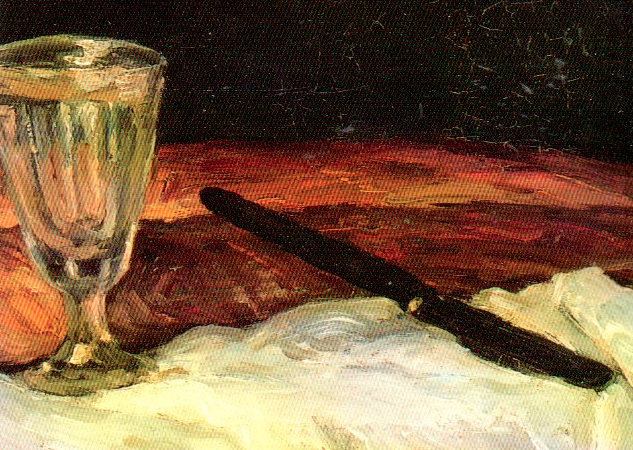That Sweetest Wine
Robert Cabot
McPherson, $25 (cloth)
In his first published fiction in thirty years (his novel, The Joshua Tree, appeared in 1970), Robert Cabot sets gorgeous imagery and rich streams of consciousness on spindly intellectual and dramatic scaffolding. Filled with intimations of mortality, celebrations of indifferent nature, and disdain for contemporary civilization, That Sweetest Wine is made up of a trio of novellas that sing—often intriguingly—of the vanishing ways of the peasant primeval.
Cabot joins the techniques of modernism, its love of language for its own sake, to an elemental, sometimes simple-minded romanticism of the male. At its worst, Cabot’s treatment of the masculine recalls the low points of Hemingway and Lawrence—once upon a time, men were men, and lived off the land with a stoic wisdom and innocence warmed by the pagan sun. Misguidedly dedicated to progress and economic well being, modern society turns the sons of these men into decadent fools, and their daughters into nags or helpmates who supply half-hearted nurturing. Even if you find this nostalgic vision emotionally compelling, the set-up needs lots of skepticism and/or irony to generate variations on the monotonous theme. Unfortunately, both are in short supply.
The first novella, "Breath of the Earth," chronicles the decline of the manly rapport with the good earth. Set in Italy, the tale jumps from the lucky heroics of 1797, when a farmer defeats an invasion of pirates by shooting off a cannon, to the farce of 1997, when the barren land, now overrun by tourists, is tended by fragile old men. In between a man talks about the joys and sorrows of a farmer’s life. Hard work is leavened by delicious feast days: "We juggle hot shells in our fingers, scoop out the meat with our knives, throw ourselves in the warm sand, shielded from the dew of the fire, and our heels float up over our heads in the fumes of the heavy wine." Sensations offer saving shocks of comfort: "nightingales screeching, the squawk and thumping of a pheasant, the cuckoo chucking like a chicken—the green smells of grasses and thistles hurrying to flower before the summer death, frightened lizards and black snakes twisting away."
Cabot’s prose is most impressive when physical impressions jolt into language with a hedonistic rush, as when the moon rolls into view "like a bruised overripe persimmon." But the narrator also has the bad habit of breaking into purple philosophizing: "It is I now, looking out through those solemn eyes at an ancient world of forest without man, onto time, onto great distances. I see a world without words where the owl and snake are at peace and are all-powerful, where their stillness commands the sun and the sea." Cabot isn’t content to let his super-charged images do their work; the fresh prose of "Breath of the Earth" gets strangled in its own descriptions of cycles of cultural rise and fall: "The present is the past, the future has no meaning. I have been of the past. I have the name of heroes. We are one through the seasons, the earth, the crops, the winds, our songs, the stones of our village."
The sensibility behind the rape of the primal connection is anatomized in "A Rat in the Boardroom." An aged mega-mogul is on his deathbed, surrounded by mirrors (symbols of his narcissism) and sunk in a mental funk of astonishing poverty: "And heaven is the parent, the power to ignore and to be-better-than and to punish, the being right without effort, the eternal seat of honor, punctual and orderly, with stern authority reaching out in all directions to direct the proper course of mankind." For Cabot, the blight of our civilization stems from the marriage of self-righteous Puritanism to an unbounded secular passion for acquisition and control. Not only is this critique antique, but Cabot takes more than ninety pages to polish off his thoroughly dehumanized businessmen and his son: the mogul’s son is dispatched by the selfish values that do in his dad’s crabbed soul. The moralizing reaches a campy grandeur when, during a safari, a woman is served roasted pig’s testes. "Rat in the Boardroom" is an ugly fantasy about having your enemies’ balls on your plate.
The final novella, "Touch of Dust," returns once more to our alienation from primal forces, though the theme is given an aesthetic twist. The narrator is an artist cut off from his deepest roots; he realizes "that failure is not the end, that there is still sweet wine to be sipped with joy, wine that holds the sun." Cabot’s descriptions of the natural world are marvelously detailed: "High ripe hay, poppies—blood-red wounds salved by the icy foam of the spittle fly—magentas of lupine and clover, lavender-brushed white buds of the wild onion—plucked, its pungent smell." His characters, however, especially the woman with whom the artist is obsessed, were yanked from a petrified forest: "It is not you who failed me. Joy is, in the end, solitary. I have lost mine, through weakness or because I am woman and woman is somber and mortal, unable to walk for long with your gods"? "I am woman and woman is somber and mortal"?
Ironically, the volume flounders because Cabot doesn’t remain true to his fundamental source of power—an impressive talent for describing the external world, registering its delights and sights within a highly self-conscious prose style. Anxious to elegize a way of life, Cabot stuffs these novellas with a sermonizing that at its most pernicious recalls the deadening abstract thinking he condemns.







